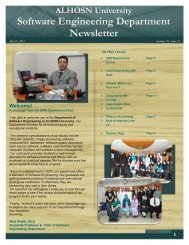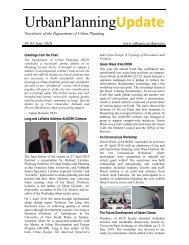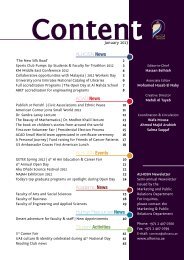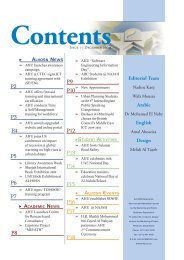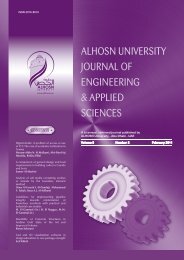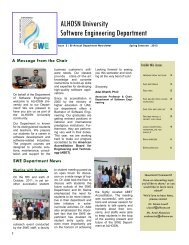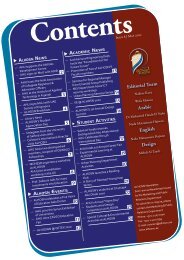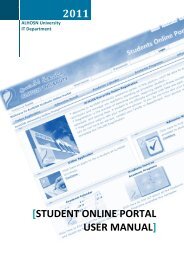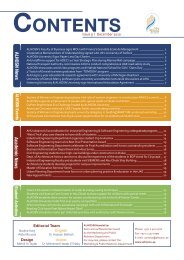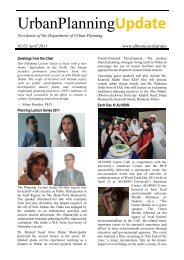ALHOSN University Catalogue Global Knowledge with Local Vision ...
ALHOSN University Catalogue Global Knowledge with Local Vision ...
ALHOSN University Catalogue Global Knowledge with Local Vision ...
Create successful ePaper yourself
Turn your PDF publications into a flip-book with our unique Google optimized e-Paper software.
To keep the Program and objectives current and relevant, the Department continuously reviews and<br />
adjusts its curriculum and the content of the courses. The required Internship provides vital engineering<br />
experience and insight to all Industrial Engineering students.<br />
Program Goals<br />
The fundamental premise of the Industrial Engineering program is to provide its students <strong>with</strong> a broad<br />
and high quality Industrial Engineering education that will enable them to apply the principles of<br />
mathematics, science, and engineering to identify, formulate, and solve engineering problems.<br />
The program provides to its students:<br />
1. A comprehensive education in the first two years in physical sciences, mathematics,<br />
engineering sciences and design.<br />
2. A measure of specialization in the third and fourth year through core and technical<br />
elective courses in the areas of Manufacturing system, Control system, Information system,<br />
Quality assurance, Production engineering/ Management, Engineering design, and International<br />
business management.<br />
3. An exposure to complementary studies subjects including engineering economics, the impact<br />
of technology on society, and communication skills.<br />
4. An exposure to engineering work environments and roles, which is emphasized by the<br />
Industrial Training INTERNSHIP.<br />
Program Educational Objectives<br />
Consistent <strong>with</strong> its commitment to provide its graduates <strong>with</strong> a solid foundation in mathematical,<br />
scientific and industrial engineering broad-based knowledge, systematic thinking and effective<br />
communication skills, and develop their engineering creativity and curiosity, professional ethics, as<br />
well as an environmental and a societal consciousness that will serve them throughout their lifetime,<br />
graduates of the Industrial Engineering Program at <strong>ALHOSN</strong> <strong>University</strong> are expected to be able to:<br />
PEO-1: Practice their Industrial Engineering profession <strong>with</strong> professionalism and ethical<br />
responsibilities and use effective communication and teamwork for excellence.<br />
PEO-2: Demonstrate the broad nature of industrial engineering disciplines, research, find more<br />
information when needed, self-learn and show that university education is only the<br />
beginning of a lifelong learning process.<br />
PEO-3: Pursue successful careers in their profession or graduate studies if so desired.<br />
Program Outcomes<br />
The undergraduate industrial Engineering curriculum includes a foundation of mathematics, physics,<br />
and chemistry. Engineering courses in fundamental areas constitute the core of the remaining<br />
curriculum. Several technical electives allow the undergraduate student to specialize somewhat or to<br />
pursue broader understanding. An internship program embeds the junior students to real-world<br />
working engineering environments. A senior capstone design experience culminates the curriculum.<br />
The articulated BSIE program outcomes shall lead to the satisfaction of all program educational<br />
objectives and embed ABET outcomes (a-k) and the industrial engineering program criteria. Upon<br />
completion of the BSIE Program, graduates shall have:<br />
PO-A: an ability to apply knowledge of mathematics, science, and engineering [ABET (a)]<br />
PO-B: an ability to design and conduct experiments, as well as to analyze and interpret data<br />
[ABET (b)]<br />
PO-C: an ability to design a system, component, or process to meet desired needs <strong>with</strong>in realistic<br />
constraints such as economic, environmental, social, political, ethical, health and safety,<br />
manufacturability, and sustainability [ABET (c)]<br />
PO-D: an ability to function on multidisciplinary teams [ABET (d)]<br />
PO-E: an ability to identify, formulate, and solve engineering problems [ABET (e)]<br />
PO-F: an understanding of professional and ethical responsibility of industrial engineers [ABET<br />
(f)]<br />
104




